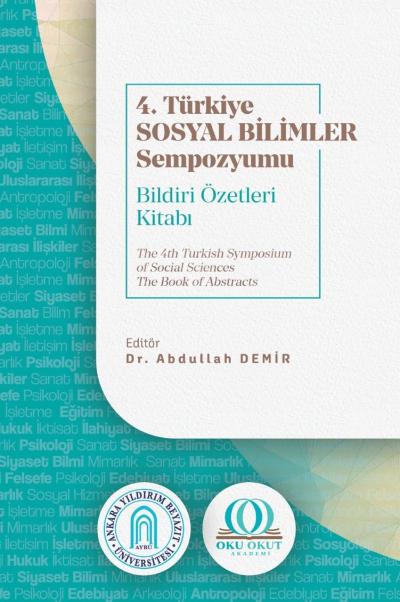Oku Okut Yayınları, kitabın yayım ve dağıtım hakkını saklı tutar. Ticari kullanım için yayınevine başvurulması gerekir.
Yūsuf al-Hamadānī’s View on Religion and Society
Yûsuf el-Hemedânî’nin Din ve Toplum Görüşü
Yazarlar
-
Yüksek Lisans Öğrencisi Servet Şahinhttps://orcid.org/0009-0000-0916-6689
Not many works have been written about the life of Yūsuf al-Hamadānī, who enlightened the past and present with his Khorasan-based scholarly activities. Hamadānī developed a human-oriented education system in the geography where he lived. As a matter of fact, the introduction of Central Asia and Anatolia to Islam through the people he raised is an example of this. When Hamadānī’s life is analysed, it is seen that he was not only a Sufi; he was also a person who read the society well and gained the favour of the society and the state administration in terms of his position. In this context, the subject of this study is Yūsuf Hamadānī’s view of religion and society. The ideas of Hemedānī, who had a Sufi lifestyle, formed the database of the study. Hamadānī’s views on religion and society were collected and the study was shaped accordingly. The fact that Hemedānī, who was in the society with his views on religion and society and tried to produce solutions to the problems of the society with his teachings to the extent possible, was the teacher of Aḥmad Yasawī and Abdul Khaliq Ghijduwanī, had an influence on the formation of two Sufi schools such as Yassawism and Naqshbandism, constantly preserved the state and nation consciousness and was an example to the society in this respect makes the study important. The study aims to get to know Hamedānī’s world of ideas, to understand how he established a relationship between religion and society, how Hemedānī realised his ideas in a geography where different religions and sects lived together, the period he lived in and the socio-economic conditions of this period. In the study, a literature review was conducted using qualitative research method and data collection technique was used. Especially Hamadānī’s works, writings and articles written about him were analyzed in the context of the sociology of religion. The following results were reached in the research: Hamadānī stated that any external correction would be incomplete or inadequate without regulating one’s own inner world and morality, and he considered the correctness of the zahāhir as the correctness of the west. Hamadānī advised people to support every legitimate movement for the benefit of society to the extent of their power, and he himself pioneered this with his services. Hamadānī especially emphasised halal food in terms of religion and society and stated that halal nutrition was essential for the protection of social order. Hamadānī, who was a member of the Ahl al-Sunna belief, stated that the law and the legislator were essential for the peace and survival of a society, and commanded obedience to the state and the head of state unless he encouraged prohibition and commanded haram. In accordance with this principle, he was obedient to the state and the head of state, contrary to the western movements of his time, and encouraged his followers to do the same.
Horasan merkezli ilmî faaliyetleriyle dünü ve bugünü aydınlatan Yûsuf el-Hemedânî’nin hayatına dair bugüne kadar fazla eser kaleme alınmamıştır. Hemedânî yaşadığı coğrafyada insan odaklı bir eğitim sistemi geliştirmiştir. Nitekim Orta Asya ve Anadolu’nun yetiştirdiği insanlar aracılığıyla İslam’la tanışması buna örnektir. Hemedânî’nin hayatı incelendiğinde onun sadece bir mutasavvıf olmadığı; aynı zamanda toplumu iyi okuyan ve durduğu yer itibariyle toplumun ve devlet yönetiminin teveccühünü kazanan biri olduğu görülmektedir. Bu bağlamda çalışmanın konusunu Yûsuf Hemedânî’nin Din ve Toplum Görüşü oluşturmaktadır. Tasavvufi bir hayat tarzına sahip olan Hemedânî’nin fikirleri çalışmanın verisel tabanını oluşturmuştur. Hemedânî’nin din ve topluma dair görüşleri toplanarak bu doğrultuda çalışma şekillendirilmiştir. Din ve topluma yönelik görüşleriyle toplumun içinde olan ve öğretisiyle toplumun problemlerine imkânı ölçüsünde çözüm üretmeye çalışan Hemedânî’nin Ahmet Yesevî ve Abdulhalık Gücdüvani’nin hocası olması, Yesevilik ve Nakşibendilik gibi iki sufî ekolün oluşmasında etkisinin bulunması, devlet ve millet bilincini sürekli muhafaza etmesi ve bu yönüyle de topluma örnek oluşu çalışmayı önemli hale getirmektedir. Araştırmanın amacı; Hemedânî’nin fikir dünyasını tanımak, din ve toplum arasında nasıl bir ilişki kurduğunu anlamak, Hemedânî’nin fikirlerini farklı din ve mezheplerin bir arada yaşadığı coğrafyada nasıl hayata geçirdiğini, yaşadığı dönemi ve bu dönemin sosyolojik yapısını anlamaktır. Çalışmada nitel araştırma yöntemi kullanılarak literatür taraması yapılmış, veri toplama tekniğinden yararlanılmıştır. Başta Hemedânî’nin eserleri olmak üzere hakkında yazılan yazılar, makaleler din sosyolojisi bağlamında ele alınarak incelenmiştir. Araştırmada şu sonuçlara ulaşılmıştır: Hemedânî, insanın kendi iç dünyasını ve ahlâkını düzene koymadan, dışarıya yönelik herhangi bir düzeltme yapmanın eksik veya yetersiz olacağını ifade etmiş, zahirin düzgünlüğünü batının düzgünlüğü olarak değerlendirmiştir. Hemedânî, insanlara toplumun menfatine olan meşru her harekete güçleri nispetinde destek vermelerini tavsiye etmiş, kendisi de hizmetleriyle buna öncülük etmiştir. Hemedânî özellikle din ve toplum açısından helal lokmanın üzerinde durarak toplum düzeninin korunması açısından helalle beslenmenin şart olduğunu belirtmiştir. Ehl-i Sünnet akideye mensup Hemedânî, kanun ve kanun koyucunun bir toplumun huzuru ve bekası için şart olduğunu belirtmiş, yasağa teşvik ve haramı emretmedikçe devlete ve devlet başkanına itaati emretmiştir. Bu ilke gereği devrinde vuku bulan batınî hareketlerin aksine devlete ve devlet başkanına karşı itaatkâr olmuş sevenlerini de buna teşvik etmiştir.
Telif Hakkı
Telif Hakkı (c) 2024 Oku Okut Yayınları
Lisans

Bu çalışma Creative Commons Attribution-NonCommercial 4.0 International License ile lisanslanmıştır.
İndir
Yayın Bilgisi
-
Yayın TürüBölüm
-
Cilt
-
Sayfalar75-78
-
Yayım Tarihi24 Ağustos 2024
-
Dizi
-
Dizi No.6
-
Kategori
Şahin, Servet. “Yûsuf El-Hemedânî’nin Din Ve Toplum Görüşü”. 4. Türkiye Sosyal Bilimler Sempozyumu: Bildiri Özetleri Kitabı. ed. Abdullah Demir - critical ed . 6/75-78. Sosyal Bilimler Bildirileri. Ankara: Oku Okut Yayınları, 2024. https://doi.org/10.55709/okuokutyayinlari.305












